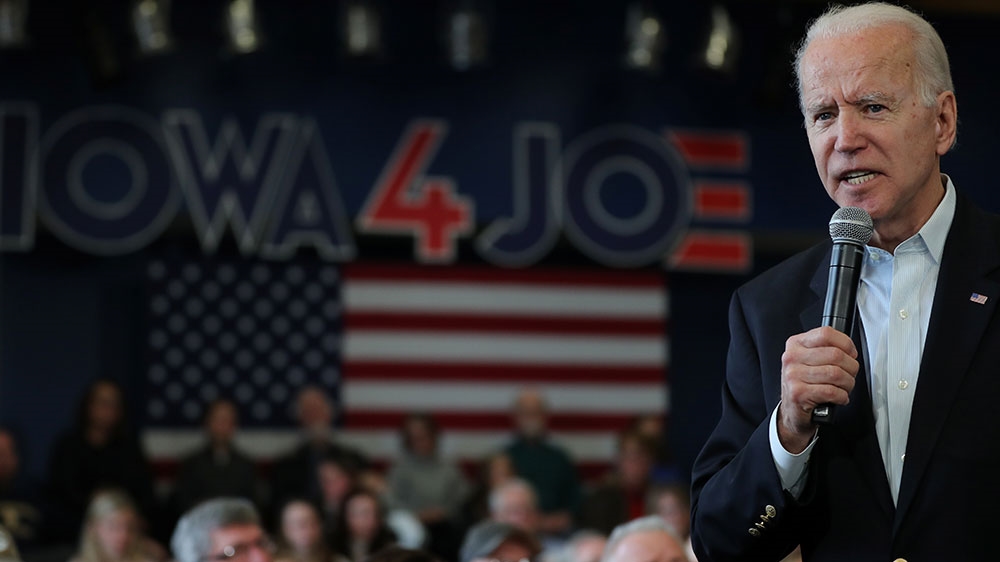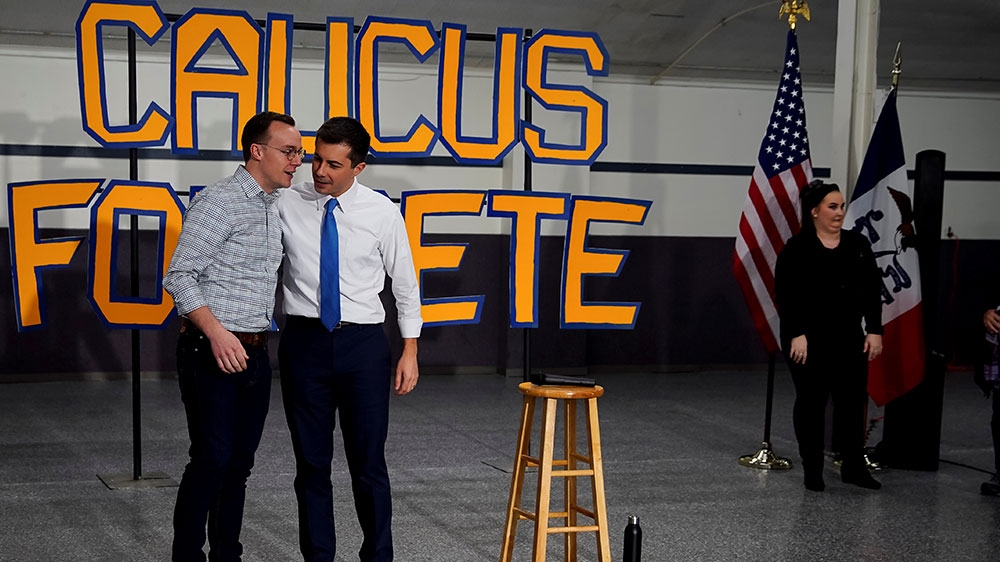Iowa caucus: ‘Which Democrat can beat Trump’ tops voters’ minds
The US state is set to kick off the caucus and primary season of the 2020 presidential race.

Ames, Iowa – Iowans from across the US state will gather at churches, mosques, community centres, homes and elsewhere on Monday evening to caucus for Democratic presidential candidates.
Monday’s caucuses will kick the 2020 presidential election into high gear, with the rest of the US states and territories to follow with their own primaries or caucuses over the next five months.
Keep reading
list of 3 itemsUS election 2020: What are presidential primaries and caucuses?
US elections 2020: When are the debates, primaries, conventions?
“Every time I think I’ve made a decision, something pushes me the other direction,” said Kevin Caballin at a recent campaign rally for Senator Amy Klobuchar in Ames, Iowa.
Caballin said he has seen more than two dozen of the original Democratic candidates and two Republican candidates in about 120 campaign events this election cycle.
The election comes at a time of deep divisions within the United States, amid an impeachment trial and divisive rhetoric coming from the White House and Capitol Hill.
While Caballin said he likes Klobuchar, he is worried about her lack of name recognition.
He’s not the only undecided caucus-goer in the room. Many people at the event late last month said they will make a decision the night before or day of the caucus.
A CBS News poll, released on Sunday, suggested that Senator Bernie Sanders and former Vice President Joe Biden were neck-and-neck at 25 percent each.

Former South Bend, Indiana, Mayor Pete Buttigieg was in third at 21 percent, and Senator Elizabeth Warren was in fourth place at 16 percent. Klobuchar was at 5 percent.
All the other candidates – Senator Michael Bennet, former New York City Mayor Michael Bloomberg, US Representative Tulsi Gabbard, former Massachusetts Governor Deval Patrick, billionaire Tom Steyer and entrepreneur Andrew Yang – polled at less than 5 percent. The poll’s margin of error was plus or minus three points.

The release of the results of what’s been dubbed the “most influential poll” before the Iowa caucuses – from the Des Moines Register, CNN and Mediacom – was cancelled at the last minute after candidates were left out of different questions of the interview.
“Polls are only good the day the pollsters are in the field,” said Dennis Goldford, professor of political science at Drake University.
Electability
Top of the mind for many caucus-goers in Iowa were issues like healthcare, education and climate change – as well as how electable each candidate is over President Donald Trump.
“What kind of overshadows everything, is people in Iowa and across the nation like different people,” said Dianne Bystrom, director emerita of the Carrie Chapman Catt Center at Iowa State University. “But then, if you ask, who’s the best able to beat Donald Trump, it seems like it’s always Biden. I see Democrats being a lot more cautious this year.”
For Caballin, he said he likes everything that Warren and Sanders have said, but he is worried they will not be able to muster widespread support.
“I don’t know if they’re gonna scare moderates and disillusioned Republicans who don’t like Trump and are just saying ‘Give us someone we can vote for,'” Caballin said.

Goldford, who is also a co-author of a book about the history of caucuses, said he sees more of an urgency among Democrats to replace Trump than in the 2004 election against incumbent George W Bush.
“The Democrats nationwide, as well as here in Iowa, are in the middle of an argument of who is better positioned to defeat an incumbent president. A progressive, like Sanders or Warren, or a more centrist liberal, like Biden, Buttigieg or Klobuchar,” Goldford said. “What’s going to win out? Head or heart?”
Outsized influence?
The Midwestern state has served as a launching platform for both Republicans and Democrats since the 1970s, when little-known Jimmy Carter campaigned heavily in the state, placed well and went on to become president. It has led to most candidates now spending an enormous amount of time in the state.
In recent years, the state has fielded increasing criticism of its outsized influence, because its populace does not reflect the diversity of the greater United States. The process has also come under fire for being less inclusive as primaries, because it does not allow for people working during those hours or out of state to participate. This year, a few satellite locations around the US – and internationally – will attempt to temper some of that criticism.
“In summary, Iowa’s position number one is truly a matter of historical accident. Nobody said in either party, ‘Gee, here is a list of criteria that should determine which states should go first in a sequential nomination process, and oh look, Iowa turns out to fit those criteria better than any other state,'” Goldford said.

Still, election observers have continued to closely watch the results of the Iowa caucuses, with high expectations that whoever does well in Iowa will do well overall.
The candidates, too, have been zig-zagging across the state to campaign. The four candidates who are also senators have been flying back and forth between Iowa and Washington, DC, during the impeachment trial of Trump, which requires mandatory participation.
Bystrom said observers usually look at the top three candidates in the Iowa caucus, but this year, there could be “four tickets” out of Iowa. Those tickets will garner candidates’ national standings and ability to fundraise, as well as narrowing the field.
Over the years, the results have been mixed. While Hillary Clinton bested the field of Democratic hopefuls in 2016, for example, her husband, Bill, came in a dismal fourth place in 1992, but later won the presidency.
Further complicating those results is that, in addition to some candidates simply sitting out of the Iowa contest, caucus-goers, unlike primary voters, go through more than one round of counting, engaging in what Bystrom refers to as “caucus math”. If, in any precinct, a candidate does not reach a viability threshold of at least 15 percent, his or her supporters must choose a second-choice candidate for the subsequent round.
“[In the past,] candidates have used it to basically peel off some of the delegates that they don’t need, and send them to other camps, basically to weaken the other strong candidates. This year, you can’t do that,” Bystrom said, explaining that supporters from viable camps will not be able to switch camps on the second round of counting.

Even with all the caveats, both Bystrom and Goldford will still be looking to see what the caucuses produce. For the Drake University professor, he said he will be looking at how large turnout is, both in sheer numbers, and also among voters under 45 years old. He is also curious to see how well each candidate does against the same “opponent” in every election.
“[It’s] name is “expected.” Did you do better than expected, or did you do worse than expected?” Goldford said.
